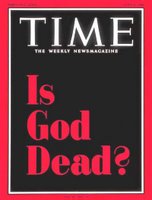Must religion and science always clash?
 "God vs. Science" is the cover story in the November 5, 2006 edition of Time Magazine. It brings back memories of Time's April 8, 1966 lead story. Are you old enough to remember the famous issue that asked the very provocative (for then) question: "Is God Dead?" According to most of polls these days, God is anything but dead in the U.S.
"God vs. Science" is the cover story in the November 5, 2006 edition of Time Magazine. It brings back memories of Time's April 8, 1966 lead story. Are you old enough to remember the famous issue that asked the very provocative (for then) question: "Is God Dead?" According to most of polls these days, God is anything but dead in the U.S.But that's not for lack of trying on the part of a new breed of atheists including Richard Dawkins, author of "The Selfish Gene"and most recently "The God Delusion". Dawkins is interviewed in Time's "God vs. Science" and also as part of Wired Magazine's November 2006 lead story: "The Church of the Non-Believers". He and others have mounted an aggressive campaign against the belief in God. As Gary Wold points out in the Wired piece: Dawkins and his colleagues Sam Harris and Daniel Dennett "condemn not just belief in God but respect for belief in God." For them, "Religion is not only wrong; it's evil."
So what's reignited the long smoldering feud between science and religion? Could it have something to do with recent advances in science like the Human Genome Project and Stem Cell research on one hand, and the emergence religious movements like Creationism and Intelligent Design on the other? Bible Belters vs. Intellectual Elitists v.2006?
Whatever the cause, is either/or the only option in this discussion? Not according to Owen Gingerich, a professor of astronomy who believes in a Universe of purpose and intention and explains how he reconciles his comittments to science and faith in an elegant little book entitled "God's Universe" or the Dalai Lama, who, in his book "The Universe In A Single Atom" makes a convincing case that "Spirituality and science are complimentary but different investigative approaches with the same goal of seeking the truth. In this, there is much each may learn from the other, and together they may contribute to expanding the horizon of human knowledge and wisdom." (GW)
God vs. ScienceWe revere faith and scientific progress, hunger for miracles and for MRIs. But are the worldviews compatible? TIME convenes a debate
TIME Magazine
There are two great debates under the broad heading of Science vs. God. The more familiar over the past few years is the narrower of the two: Can Darwinian evolution withstand the criticisms of Christians who believe that it contradicts the creation account in the Book of Genesis? In recent years, creationism took on new currency as the spiritual progenitor of "intelligent design" (I.D.), a scientifically worded attempt to show that blanks in the evolutionary narrative are more meaningful than its very convincing totality. I.D. lost some of its journalistic heat last December when a federal judge dismissed it as pseudoscience unsuitable for teaching in Pennsylvania schools.
But in fact creationism and I.D. are intimately related to a larger unresolved question, in which the aggressor's role is reversed: Can religion stand up to the progress of science? This debate long predates Darwin, but the antireligion position is being promoted with increasing insistence by scientists angered by intelligent design and excited, perhaps intoxicated, by their disciplines' increasing ability to map, quantify and change the nature of human experience. Brain imaging illustrates--in color!--the physical seat of the will and the passions, challenging the religious concept of a soul independent of glands and gristle. Brain chemists track imbalances that could account for the ecstatic states of visionary saints or, some suggest, of Jesus. Like Freudianism before it, the field of evolutionary psychology generates theories of altruism and even of religion that do not include God. Something called the multiverse hypothesis in cosmology speculates that ours may be but one in a cascade of universes, suddenly bettering the odds that life could have cropped up here accidentally, without divine intervention. (If the probabilities were 1 in a billion, and you've got 300 billion universes, why not?)
Roman Catholicism's Christoph Cardinal Schönborn has dubbed the most fervent of faith-challenging scientists followers of "scientism" or "evolutionism," since they hope science, beyond being a measure, can replace religion as a worldview and a touchstone. It is not an epithet that fits everyone wielding a test tube. But a growing proportion of the profession is experiencing what one major researcher calls "unprecedented outrage" at perceived insults to research and rationality, ranging from the alleged influence of the Christian right on Bush Administration science policy to the fanatic faith of the 9/11 terrorists to intelligent design's ongoing claims. Some are radicalized enough to publicly pick an ancient scab: the idea that science and religion, far from being complementary responses to the unknown, are at utter odds--or, as Yale psychologist Paul Bloom has written bluntly, "Religion and science will always clash." The market seems flooded with books by scientists describing a caged death match between science and God--with science winning, or at least chipping away at faith's underlying verities.
Click here to read the entire article in Time.


0 Comments:
Post a Comment
<< Home